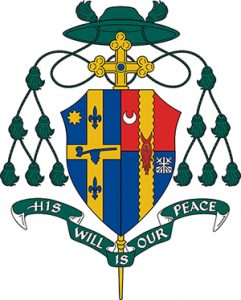Bishop Jenky is reflective, grateful ahead of 20th anniversary and 75th birthday
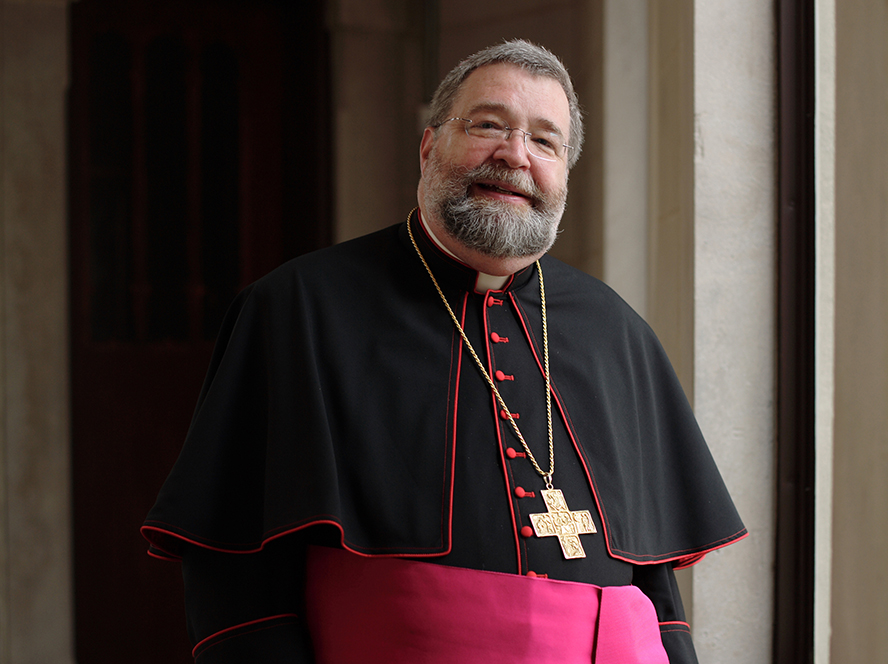
Bishop Daniel R. Jenky, CSC, will mark the 20th anniversary of his appointment as the eighth Bishop of Peoria on Feb. 12 and celebrate his 75th birthday on March 3. (File photo by Nellie Gould)
Between COVID isolation and “getting creaky” as he ages, the last two years have afforded Bishop Daniel R. Jenky, CSC, much time for solitude and reflection.
“I’m living almost like a Carthusian monk,” the bishop acknowledged as he approaches the 20th anniversary of his appointment as the eighth Bishop of Peoria on Feb. 12 and his 75th birthday on March 3.
At age 75, bishops are required to submit their resignation to the pope. Nineteen months ago, Pope Francis appointed Coadjutor Bishop Louis Tylka to the Diocese of Peoria to assist Bishop Jenky. Since that appointment came with the right of succession, the leadership transition will be smooth and swift when Bishop Jenky’s retirement is accepted.
“It could be in today’s mail,” joked the bishop regarding the anticipated letter from Pope Francis. “‘Dear Bishop Jenky, thank you . . . now go.’”
AMONG OUR LONGEST SERVING BISHOPS
Once his retirement is announced, Bishop Jenky will take his place among the longest serving bishops in diocesan history. His two decades of leadership are the most since Archbishop Joseph H. Schlarman’s 21-year episcopacy ended in 1951. Archbishop John Lancaster Spalding, the founding Bishop of Peoria, is our diocese’s longest serving shepherd at 31 years.
Throughout his life, Bishop Jenky has loved and studied history. So what might future historians say about his time as Bishop of Peoria?
“What I hope they’d say is ‘He tried,’” Bishop Jenky told The Catholic Post in a wide-ranging interview in mid-January from his residence next to St. Mary’s Cathedral in Peoria.
Undoubtedly, the historians will have much more to say. Bishop Jenky is leaving a legacy that includes:
- several major construction projects, including the Spalding Pastoral Center in Peoria (2008) and the new Sacré-Coeur Retreat Center near Magnolia (2021), as well as a three-year restoration and redesign of St. Mary’s Cathedral, completed in 2016;
- the launching and advancement of the sainthood cause of Venerable Archbishop Fulton Sheen;
- the ordination of 52 diocesan priests and 113 permanent deacons;
- a highly successful “Rooted in Faith” capital campaign to support Catholic education, the largest drive in diocesan history; and
- a zeal for evangelization, his primary focus, evidenced in part by 19 annual “Festival Letters” offering in-depth teachings that often set the tone for diocesan efforts throughout the year.
MAJOR CHALLENGES THEN, NOW
Bishop Jenky’s two decades as Bishop of Peoria are bookended by major challenges. The clergy sex abuse scandal was dominating discussion in the U.S. church when he arrived in the spring of 2002. And the COVID-19 pandemic has transformed life in the church and in society for the past two years.
Both weigh heavy on his heart, though he is learning to “let go and let God.”
Those wishing to send Bishop Jenky a note may do so by writing him in c/o the Spalding Pastoral Center, 419 NE Madison Avenue, Peoria, IL 61603.
Bishop Jenky acknowledged it was “extraordinarily painful” to ask accused priests to step down from public ministry — he removed seven priests just two months after his arrival — but is quick to add that, for victims, “experiencing sexual misconduct is horrible.”
“There are people who will say I didn’t handle it well enough,” the bishop continued. “I handled it the best I could. Only God sees everything and knows everything. Whatever frustration I have is nothing next to what the victims went through.”
Meanwhile, the unprecedented steps taken early in the pandemic — including suspension of public worship, even during Holy Week and Easter in 2020 — as well as continuing precautions to protect the health and safety of his flock have made for difficult choices.
But Bishop Jenky emphasizes that the pandemic has also brought out the best in the diocese’s priests, deacons, religious, and lay faithful. And he is deeply grateful.
“We have a lot of wise, pastoral, committed people serving this local church,” he said. During the COVID shutdown, “we all wondered if we would have money to keep the lights on.”
“It’s just the opposite,” he says. “The people who are active in their parishes have increased their giving. They’re just wonderful people. We have a fervent local church.”
FINDING PEACE AMID HEALTH CONCERNS
When he was ordained auxiliary bishop of the Diocese of Fort Wayne-South Bend, Indiana, in 1997 after more than two decades of priestly service at the University of Notre Dame — including 20 years as rector of the Basilica of the Sacred Heart on campus — Bishop Jenky chose the episcopal motto, “His Will is Our Peace.”
After two decades as head of the Peoria Diocese with difficult decisions on his desk almost daily, he still finds his peace in God’s will.
“I think it’s faith to let go, and let God,” he says. “The Lord reads the heart and mind and soul of your unworthy servant here.”
It is wisdom he is especially taking to heart “as I make room for Christ at this stage in my life, as I let go of what passes for health and I let go of working.”
Bishop Jenky once easily climbed the sanctuary steps of St. Mary’s Cathedral for liturgies and traveled widely across the diocese for confirmations and other ceremonies. Now “every step is a challenge” and he needs assistance.
In a letter to the diocese’s Catholics in 2017, he named some of the health concerns that are limiting his mobility — arthritis in his hips and knees, spinal stenosis, and plantar fasciitis in his feet.
“I have a feeling that my body is about 10 years older than a lot of people at 75,” he said in the recent Catholic Post interview. The bishop laughs as he describes this stage of life as “when getting your socks on in the morning occupies a lot of your time, and then it’s almost time for a nap.”
“Thank God that Bishop Lou got here,” said Bishop Jenky of his brother bishop and successor.
THE SHEEN CAUSE
One constant through Bishop Jenky’s episcopacy has been his promotion of the sainthood cause of Archbishop Sheen, a native son and priest of the diocese whose radio and television programs, dozens of books, and love for the church’s mission work made him known around the globe.
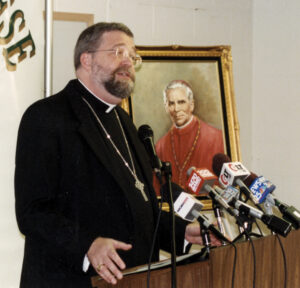
Bishop Jenky speaks at a Sept. 9, 2002, press conference announcing the Diocese of Peoria had petitioned the Vatican to open the sainthood cause of Archbishop Fulton J. Sheen. (The Catholic Post/Tom Dermody)
“The church is supposed to be the school of Christ,” said Bishop Jenky. “Well, Fulton Sheen was certainly one of the extraordinary teachers. His meditations on the Passion, on Our Lady, on charity, on forgiveness were just extraordinary. He captured the Gospel.”
When a small committee interested in Archbishop Sheen’s cause came to Bishop Jenky for his support soon after his arrival in Peoria, “I didn’t hesitate a moment.”
Already familiar with some of Archbishop Sheen’s work — “When I was in grammar school, my Dad would say, “Shut up . . . the bishop’s on!” — Bishop Jenky began listening to Sheen’s teachings on cassette as he drove across his new diocese.
While the path toward an anticipated beatification in Peoria has progressed steadily in the past two decades thanks to Bishop Jenky’s leadership and persistence — as well as the hard work and prayers of many — it has sometimes proven rocky. A protracted legal fight over the return of Archbishop Sheen’s remains to Peoria was eventually resolved, and a close examination of decisions he made as Bishop of Rochester caused another pause.
But Bishop Jenky insists the Vatican remains “very enthusiastic about the cause.” And a new cheerleader in Peoria is already doing his part.
“I’m hopeful and prayerful that Bishop Lou will bring the ball across the goal line,” said Bishop Jenky.
FOUNDATIONS OF HIS FAITH
A question about his own deep love for Jesus led Bishop Jenky to a brief, emotional pause, as he reflected on his upbringing on Chicago’s Southwest Side.
“I don’t want to get weepy,” he said, “except to say my parents were devout Catholics. That was simply the center of their existence. My Dad was an immigrant from Poland. My Mom’s parents were from Ireland. The thought of not doing your best to be a faithful Catholic wouldn’t enter their minds.”
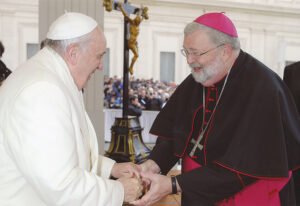
During his 20 years as Bishop of Peoria, Bishop Jenky has met with three popes, including Pope Francis in this photo from his ad limina visit in 2014.
He credited the examples of priests at St. Nicholas of Tolentine Parish such as Msgr. Michael Fennessy, a “walking pastor” who often visited with the Jenky family on their front porch. Also influential were the Adrian Dominican Sisters, as well as his Irish grandfather who came to live with the family and “whose life of faith was very deep.”
“I was surrounded by Catholic Christianity,” he says. “More important than all the books about Christ are the witnesses, and I was surrounded by that cloud of witnesses who gave their hearts to the Lord.”
But as Bishop Jenky has often taught, we all have to meet the Lord personally and make decisions throughout our lives to follow Christ. For him, one such encounter was when he tested his vocation to religious life after his freshman year at Notre Dame. He would enter the Holy Cross Fathers’ Novitiate, make his perpetual profession of vows with the Congregation of Holy Cross in 1973, and be ordained to the priesthood on April 6, 1974, at Sacred Heart Church on Notre Dame’s campus.
NOTRE DAME YEARS, AUXILIARY BISHOP
Bishop Jenky is grateful for his years at the University of Notre Dame, where in addition to his long service as rector of the basilica he also guided two residence halls, directed campus ministry, and for six years was religious superior for members of his community at Notre Dame.
“I liked religious life. I liked the common life. I love the university,” said Bishop Jenky. “I love liturgy, and while rector of the basilica I think I had five choirs, well-funded.” He also oversaw a restoration of the basilica.
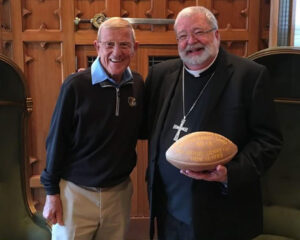
Bishop Jenky is pictured with former University of Notre head football coach Lou Holtz. Bishop Jenky was chaplain of the team when the Fighting Irish won the national championship in 1988.
“I spent Notre Dame’s money as aggressively as I knew how,” he says with a smile, calling the university “a kind of Catholic Disney World” because of its constant activities and events.
More “invaluable lessons” that would prepare him for his service in the Diocese of Peoria came when he was named an auxiliary bishop of the Diocese of Fort Wayne-South Bend in 1997.
“Suddenly I became the rector of the co-cathedral and faced the challenges that a lot of our pastors here face,” said Bishop Jenky. He also had five years of working with, and learning from, the late Bishop John D’Arcy.
“He was a tough guy, but I loved him,” said Bishop Jenky. “I learned so much about how to administrate a diocese.” Among the lessons Bishop D’Arcy taught him, even after Bishop Jenky came to Peoria, is that while you try your best, all bishops sometimes fail and are only perfected in heaven.
“I found that consoling,” said Bishop Jenky.
REASON FOR HOPE, LOOKING AHEAD
Reflecting on his years as Bishop of Peoria, Bishop Jenky spoke of his joy in meeting the faithful, from confirmation students to Newman Center residents to the grandmothers who baked pies for social events following parish functions.
“I love being at the receptions after we’ve prayed,” he said. “It’s fun being all together. This diocese can party-hearty!”
He hosted many dinners and social events at his residence, the cathedral rectory, often bringing priests together.
“This grand old house is meant to be a gathering place for the diocese,” he insists. “A lot of priests live alone, and it is good to get together and have a good meal and talk.”
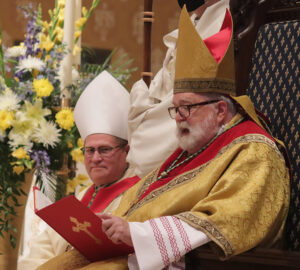
Bishop Jenky is seen with his successor, Coadjutor Bishop Louis Tylka, during a recent Mass at St. Mary’s Cathedral in Peoria. (The Catholic Post/Jennifer Willems)
Bishop Jenky also put great energy into “filling up the cathedral” with a variety of special Masses and making the cathedral a model for music and liturgy.
A staunch defender of religious freedom, Bishop Jenky has consistently called for Catholics to “rise up” when the church is challenged by a culture he says is “clearly anti-faith, anti-Catholic.” But while the church faces challenges, he finds his hope and confidence in Christ, and in history.
“When was there a time the church wasn’t in endless trouble?” he asks. “Sin isn’t new. Theological deep division isn’t new. Sheer cussedness isn’t new. But in the middle of all that, there is intense holiness and generous service.”
One of his oft-quoted phrases, spoken first at the conclusion of his installation Mass, is “Isn’t it great to be Catholic?”
“Who is like the Catholic Church in the world, in season and out of season, doing the corporal works of mercy, feeding the hungry, clothing the naked?” he asked near the conclusion of last month’s interview. He pointed out the church’s “intellectual system that is second to none,” its impact on the arts, and especially the sacraments that offer Christ’s grace and mercy.
“When I fail real badly, what do I turn to? Confession. What a deal!” he says. “Every stupid thing you’ve done, forgiven.”
“It’s not a hobby,” he says of Catholic life. “It’s people deeply committed to the life of the Gospel. And old Lucifer is not going to win against that.”
Asked his post-retirement plans, Bishop Jenky said Bishop Tylka has “kindly said I could stay living in the cathedral rectory.”
“When you say ‘home,’ I think of here,” he said.
However, should his health warrant it, “Notre Dame makes more sense.” The Holy Cross Fathers have made a room available for him in Corby Hall, the infirmary is near, and so are his religious confreres.
Bishop Jenky entrusts that pending decision the same way he has tried to manage countless others.
“I’ll just let God take care of it,” he said.
EDITOR’S NOTE: This story was part of a 56-page special issue of The Catholic Post published on Feb. 13, 2022. To view the entire edition online, click here. For a keepsake copy, email cathpost@cdop.org or call (309) 397-7907.





